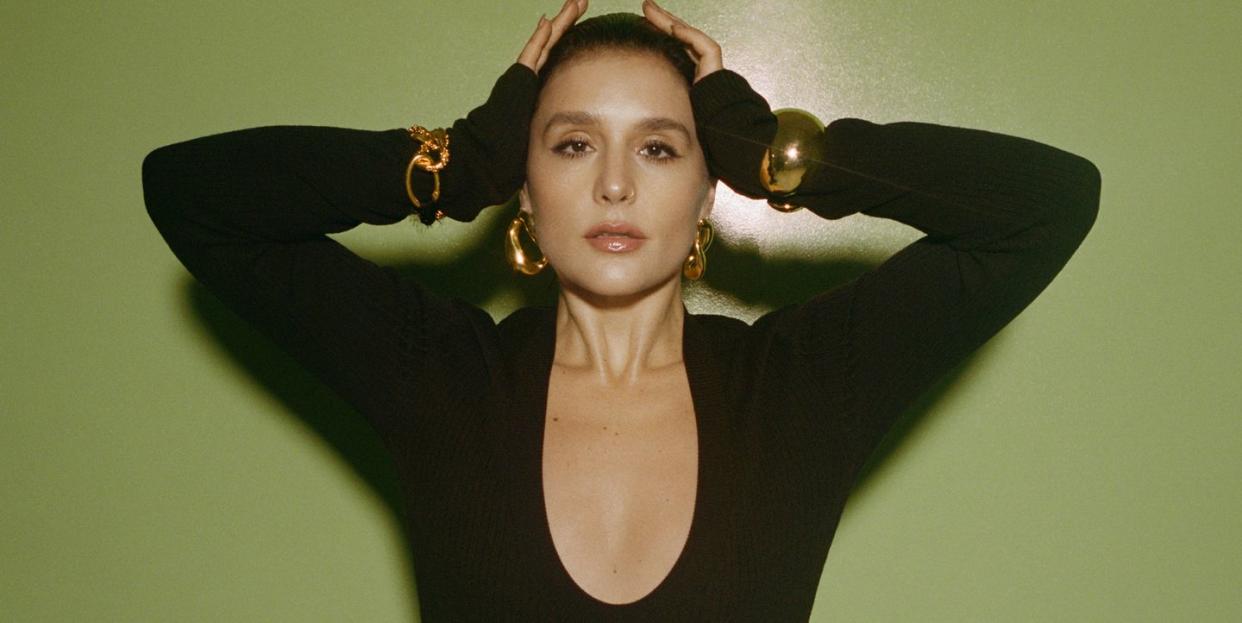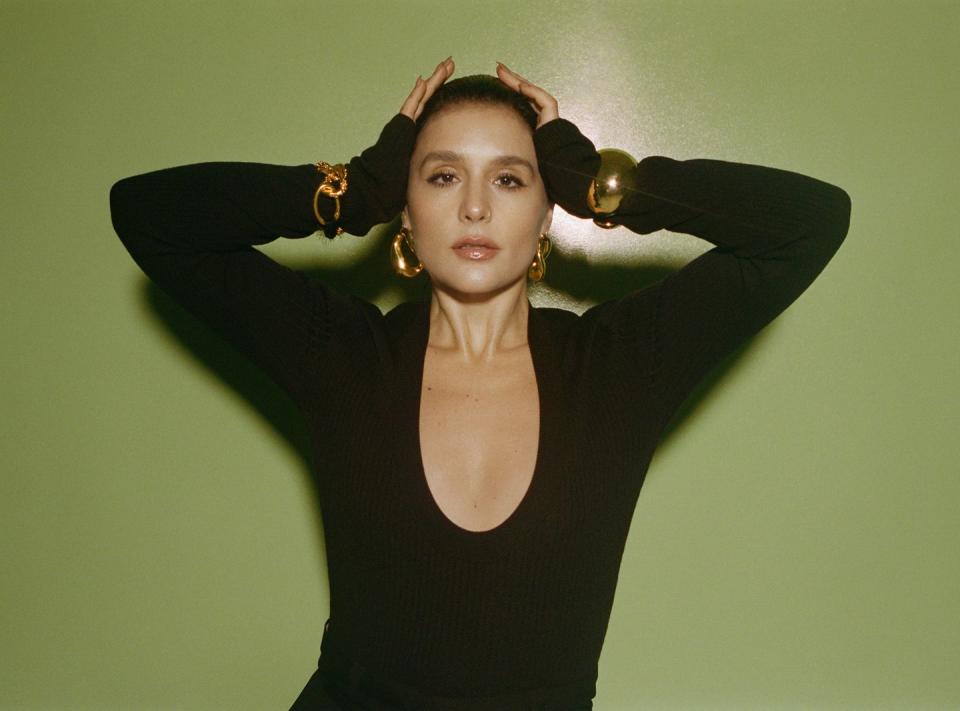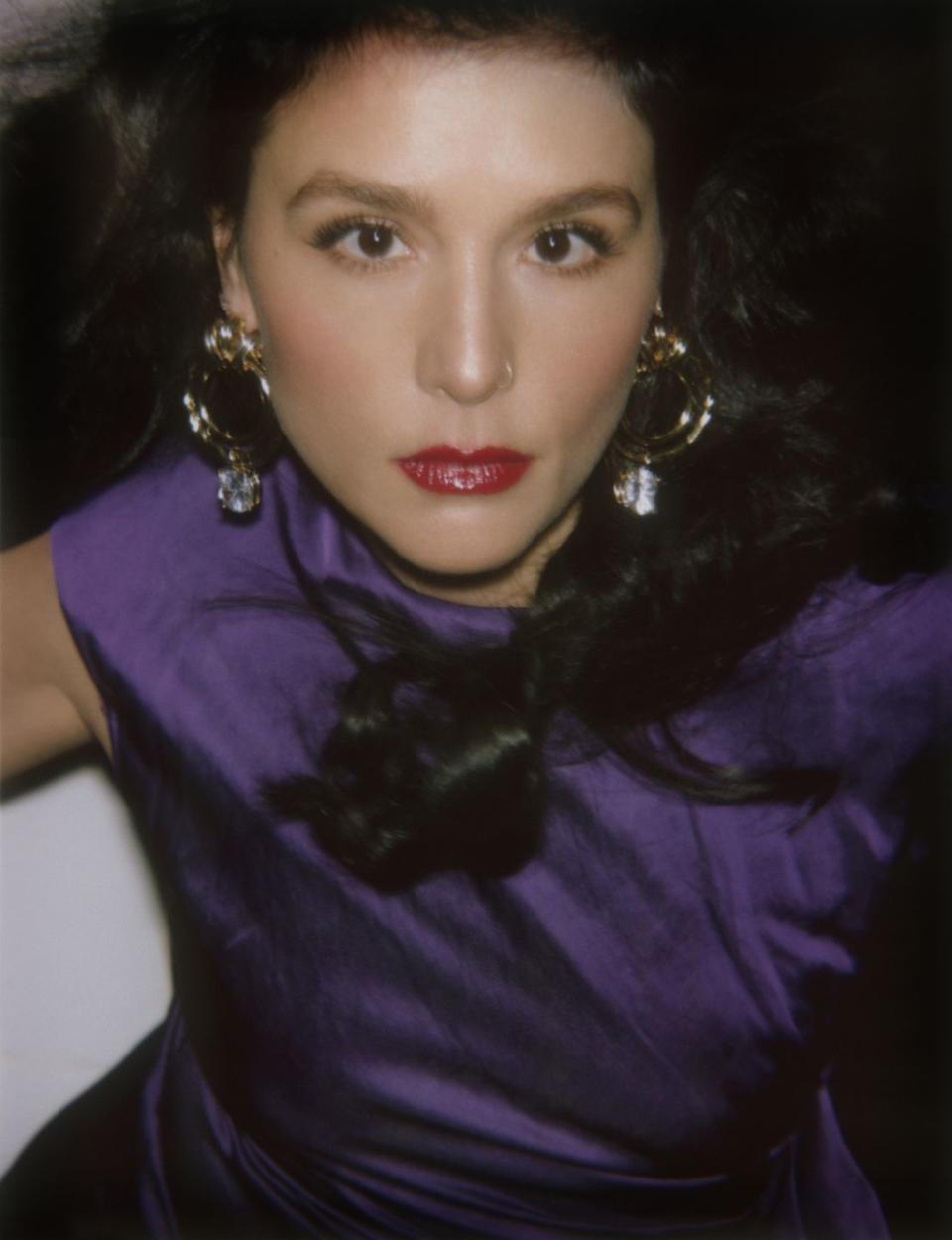Jessie Ware Makes Quarantine Less Lonely with 'What’s Your Pleasure?'

When Jessie Ware calls ELLE.com on Zoom in mid-June, it’s 7:30 p.m. her time, and the sun peeking in from the window bathes the English singer in a shimmering golden halo. It’s a fitting light for Ware, 35, who’s about to drop one of the year’s most urgent and joyful releases, What’s Your Pleasure? In 12 tracks, Ware invites listeners to abandon all earthly tethers in search of otherworldly escapism. It’s unexpected timing for such a slinky, sexy album—one that demands dance floors filled with writhing, intertwined bodies. What’s Your Pleasure? shifted release dates several times as the music industry readjusts to an ongoing global pandemic: concerts canceled and “standard” promo appearances relegated to taped performances from home (of which Ware’s done several, all cheeky, sleek, and spectacular).
At the same time, it’s perhaps the most opportune moment for Ware to return with a collection this tight and propulsive. After her star-making 2012 debut, the singular Devotion, and two well-received follow-ups (2014’s Tough Love and 2017’s Glass House) that strategically built upon her early foundation, the singer-songwriter is now making music she says is exclusively for her to enjoy—though she certainly doesn’t mind how much audiences are embracing the sound this go-around. Here, Ware walks ELLE through her return to the dance floor, finding joy in the work, and why What’s Your Pleasure? might just be her favorite album yet.
Why this album, and why now?
I needed to kickstart a love affair with music [again]. I came off tour and thought, “I need something more in my live shows.” I needed to listen to my fans. I’d made this slow, confessional record, but maybe people wanted something else from me. And that’s fine! I wanted to do that too. I needed to do something different, to test myself. And I needed to enjoy making the music again.

How did you find that pleasure again?
It was about being with the right people and departing from the wrong people. I never knew how much management could change your life. I’d lost my confidence, and I didn’t understand it because my podcast [Table Manners] was taking off and people were really buying into this thing that was a pure accident. I was losing my voice. This is not me saying I don’t believe in the last two records, but I was seeking approval from people whose opinions I didn’t value. It became this imbalance that wasn’t right and wasn’t nurturing and wasn’t good for me.
I’m the breadwinner. I was getting to the point where music was having to be like bread and butter [and] I was going to potentially have to make decisions I didn’t wanna make, which would jeopardize and discredit both the music I was making and my artistry. Everything had to implode a little bit for it all to work out. With this record [it was all about] new management, a new label, one executive producer, a very small amount of people working on it, and intimacy. I needed everything to feel less intimidating and pressurized.
It’s been fascinating to watch you intentionally untether yourself from the traditional “album, rest, album, rest” cycle when you started releasing one-off singles last year. How did that rollout change your mind about music as a passion again?
Subconsciously, it was a way of testing the waters to see if people were gonna dig this direction. I enjoyed that freedom of being like, “Here’s a song, I hope you like it. If you don’t, it doesn’t fucking matter, because I’ve got some more tunes.” I also knew that I was gonna have a baby, so I didn’t want to have to “hide myself away as a pregnant woman.” It felt ridiculous. So I was just like, “Right, more music, here you go.”
The former president of Virgin, Ted Cockle, said, “The world has changed since you put your last record out. You’re making dance music—that’s what you want to make. Put it out like a DJ. People don’t care about this big buildup for an album anymore. They just wanna fucking hear your music!”
Was part of the fun of making this record a result of you setting your own expectations for once?
I didn’t want people telling me what they thought. I wanted to know what I felt—and much respect to my label for letting me do that and not being overbearing. I think they knew I needed to get back into the groove of enjoying myself, to take some ownership and control back. I didn’t know how much I needed it until I was doing it. I realized I was making this amazing music nobody knew about! At the time, I was presenting Later… with Jools Holland. Everyone thought, “Oh, so she’s gone from podcasting to presenting a music show…what is going on? I hope Jessie’s ok!” And I’m like, “I’ve got this diamond record happening! This is fun!”
What feels different for you now?
I feel like a new artist again. There’s a real demand and interest in this record, which I haven’t felt since the first. Maybe because people have bought into the podcast, they feel like they wanna hear what I’ve got to say, even though they can hear it every bloody week. [Laughs] I feel like I’m getting opportunities I never would’ve gotten if the podcast hadn’t happened, like the TV shows I’m getting booked on. The confidence I’m showing in the delivery of these things, I feel like I’ve really grown. I’m proud of myself.

That confidence feels so apparent, especially in watching you pepper your performances with choreography all of a sudden.
I would never have done that! I got so tired of apologizing for being in the room. It wears you down and you believe you don’t deserve to be there. I finally feel like I do deserve to be there. I suit being a 35-year-old woman. I feel comfortable in my skin and with the music I’m making. I don’t want to complain because I know lots of people don’t get to a fourth album. I know I’ve got so much to appreciate. I just got disillusioned. I’ve always been in my own lane, musically, but people wanted me to get into the commercial lane, which I don’t think suits me. I made this record out of feeling and groove instead.
Has your relationship with “up tempo” songs changed?
I wanted to do a record that was driven by music and less by lyrics. The lyrics are always important, but it was very much about a beat dictating where we went. It felt fun and freeing. You’d be like, “How’re we going to navigate a Jessie Ware song around this beat?” I liked the challenge.
One of my most joyful moments was singing the “Running” remix with Disclosure at Coachella. I’m so in love with dance music. You’ll find me at the dance tent with all my friends at any festival. For me to be back in that world, and for these songs to really hit hard in a club, or when I play them live? The opportunities are limitless.
Speaking of touring, it feels like your attitude towards it changed with this record.
I feel like as an artist—and maybe lots of people disagree with me—there’s this obsession with having a live band, to show how pure your live show is. You can’t have backing tracks. I went too big on the last record with my show, because I needed to make the live experience feel “legitimate.” I don’t feel like people give a shit about that. With this record, I can go with a DJ and two backing singers and we can have the best, rowdiest time with our dance moves and our choreography. Then if we want to build it up, we can have the band—with the dance moves and the choreography! At the core of it, it’s dancing and singing and being together. When I was having to say no to shows because I couldn’t afford to do them [during the Glasshouse era, because that record necessitated a more expansive live experience]…as a live artist who loves to sing live, that felt ludicrous.
It feels like your creative gears are still really turning. Is that something you can turn off?
The last song, “Remember Where You Are,” I umm-ed and ahh-ed about whether it should go on the record. I thought it could mark the start of the next record, but it felt greedy and silly to not give it how I’ve been giving out music in the last couple of years. That’s how I wanted this album to feel. There's confidence now. I’ve done it here, but I can do it again! I can make another song like that! That’s why it’s the last one on the record, because it’s a hint of how I’m going to try to make the next record. It doesn’t stop. It exhausts my husband—but I love it. I thrive off it.
This interview has been edited and condensed for clarity.
You Might Also Like

